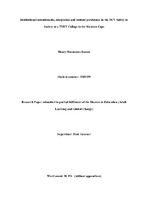| dc.description.abstract | Student dropout, certification and retention rate has played a pivotal role for academic institutions globally. There are various factors that affect student persistence which inevitably leads to a student’s failure to graduate. These factors may also result in voluntary withdrawal from institutions which could impact on the status and funding of tertiary institutions. To deal with such critical issues, there is a need to understand the reasons for the decline in student retention and the factors that influence goals and student departure. The aim of the current study was to explore the factors that may or may not contribute to persistence, which eventually has an influence on the retention rate. In the current qualitative study, Tinto’s longitudinal model was comprehensively explored. Therefore, the current study was located within Tinto’s longitudinal model of student departure. The researcher was prompted to explore the factors that influence student goals,
institutional commitments, social and academic integration and persistence. The South African government expected that the role of the TVET colleges would become the cornerstone of the skills development landscape. According to the Department of Higher Education and Training (DHET, 2013b), it was estimated that the growth in the sector would escalate as follows: the projection of 345 000 students in 2010, 630 000 students in 2013. The total projection for 2030 was that 2.5 million students would be certified (DHET, 2013b). Unfortunately, the 2030 projection has been adversely affected by the poorly performing institution and the high dropout rate. (DHET, 2013b) Therefore, the setting for the research was a Technical Vocational College in Cape Town which offers the National Certificate Vocational NCV. The single institutional study linking academic integration, goal influencers, institutional commitments social and academic integration and persistence was based in a college in Cape Town. Thus the study has an overarching research question and three sub-questions. The college was selected
conveniently and the researcher purposively selected the participants. A total of twenty participants (20) were interviewed after providing assent and consent. The qualitative design utilized in the current study allowed the researcher to identify themes. Therefore, thematic
analysis was employed in the data analysis section. The researcher is currently an insider in this sector. The unique experience and academic background of the researcher has afforded the opportunity to ethically gain access to past results in the TVET, specifically, in a NCV
programme at a Cape Town College. | en_US |

